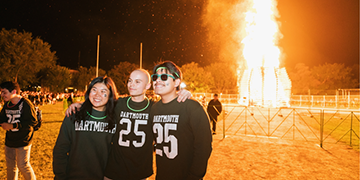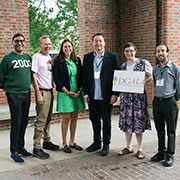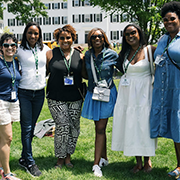Powwow and Lūʻau Celebrate Indigenous Cultures
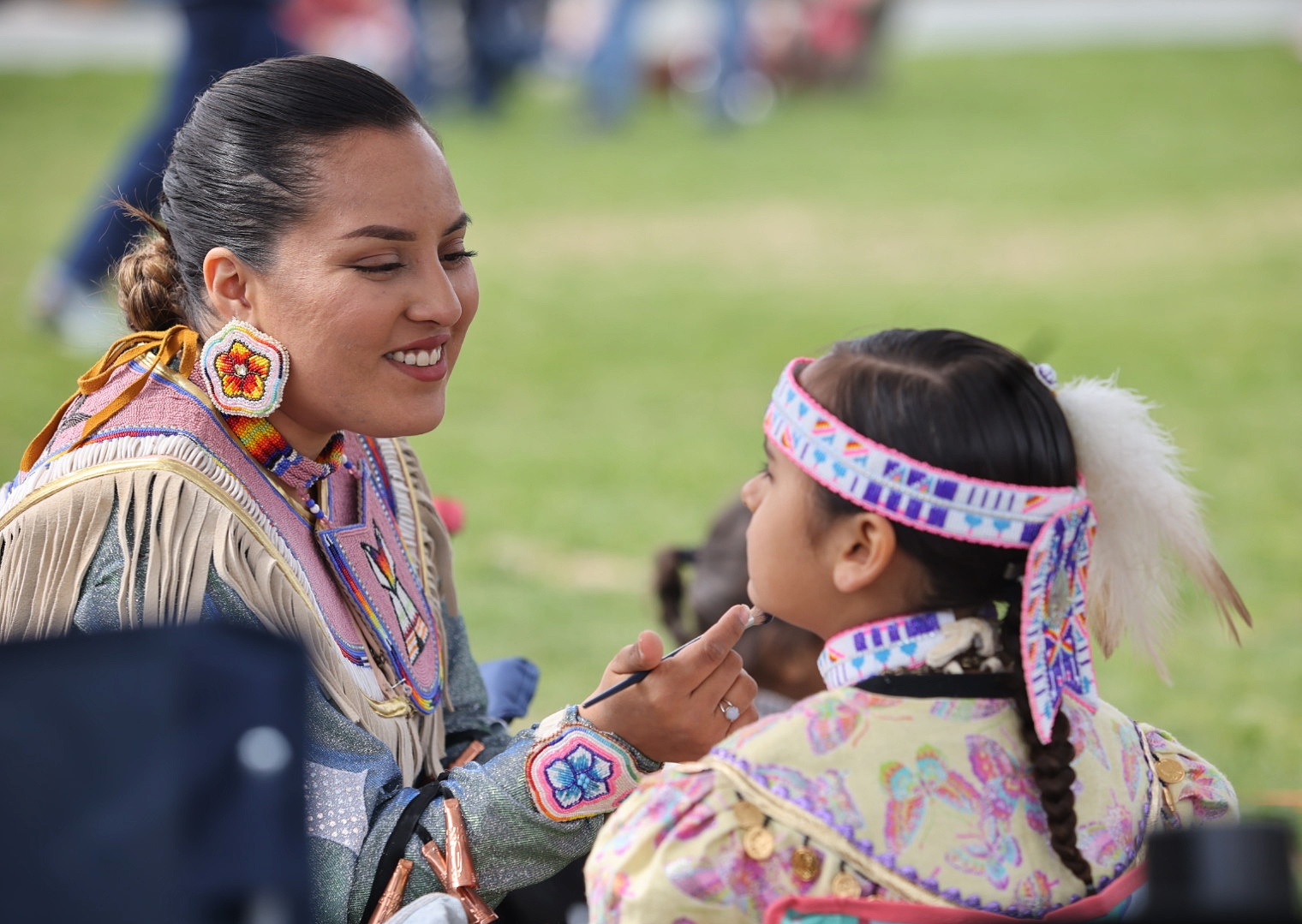
6 minute read
Charlotte Albright
6 minute read
Last weekend, students and alumni from Dartmouth’s Indigenous communities united to share cultural traditions with the Upper Valley. Undaunted by a brisk wind, dancers, singers, drummers, and other participants gathered on the Green Saturday from all over the country for the 50th annual Dartmouth Powwow, organized by the Native American Program and Native Americans at Dartmouth (NAD).
On a warmer, sunnier Sunday, the annual Lu`au, hosted by the student group Hokupa`a, featured hula dancing, ukulele music, and a Pacific Island feast.
The two-day event, co-sponsored by multiple campus partners, is part of a larger, year-long celebration of three landmark 50th anniversaries. In 1972, Dartmouth became fully coeducational, recommitted to its original mission by establishing the Native American Studies Program (now the Department of Native American and Indigenous Studies), and strengthened the College’s Black community by founding the Black Alumni of Dartmouth Association.
A Golden Anniversary
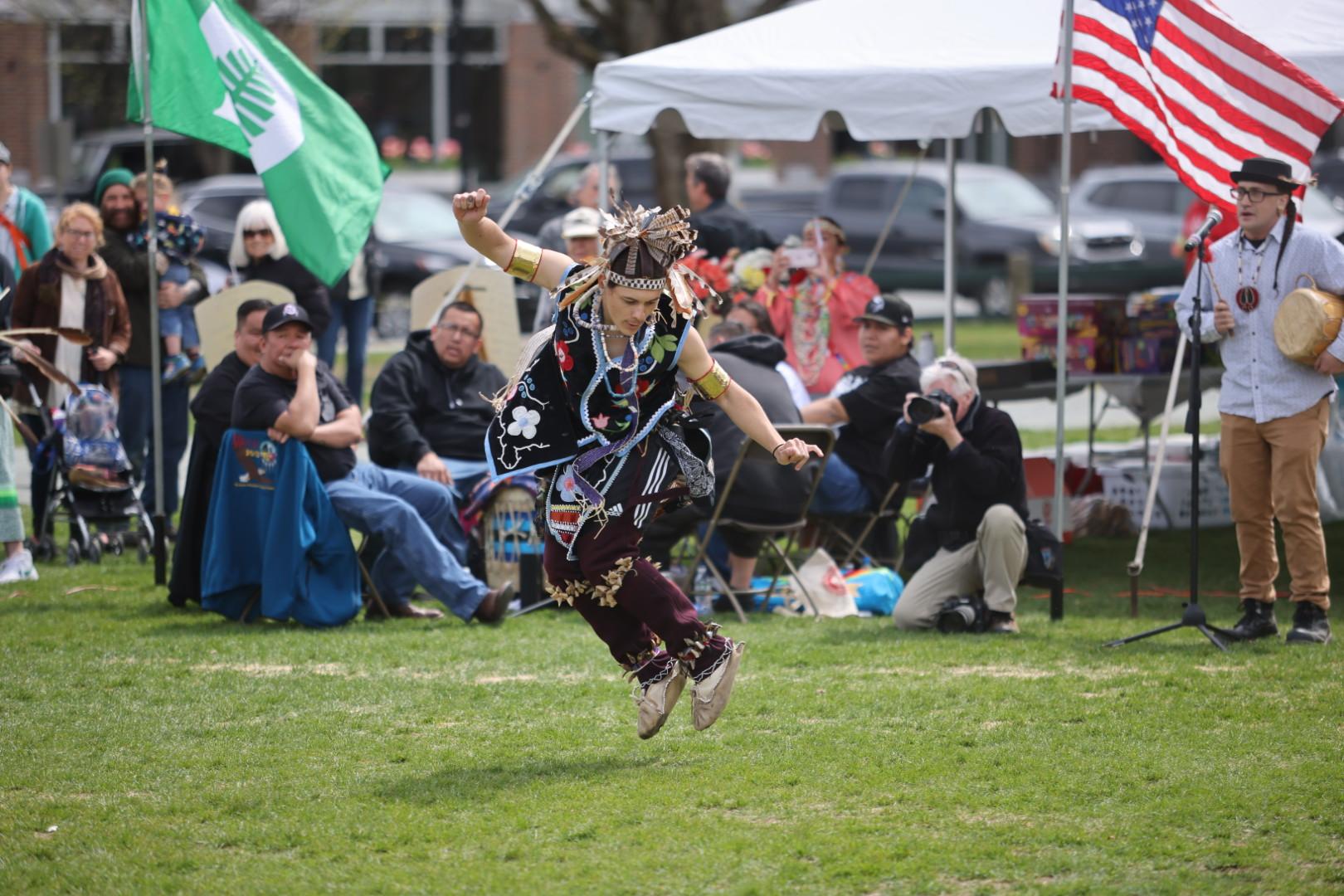 For 50 years, traditional drumming and singing have signaled Grand Entry, when key participants, led in recent times by the bearer of the eagle staff created by Vietnam veteran Trudell Guerue ’74, march into the center of the arena to begin the Powwow. This year’s head man dancer was Atsa Zah, a member of the Narragansett Nation. Head woman was Kendra Eaglestar, a member of the Jemez Pueblo Nation. Master of ceremonies was Christopher Newell ’96, a member of the Passamaquoddy Nation.
For 50 years, traditional drumming and singing have signaled Grand Entry, when key participants, led in recent times by the bearer of the eagle staff created by Vietnam veteran Trudell Guerue ’74, march into the center of the arena to begin the Powwow. This year’s head man dancer was Atsa Zah, a member of the Narragansett Nation. Head woman was Kendra Eaglestar, a member of the Jemez Pueblo Nation. Master of ceremonies was Christopher Newell ’96, a member of the Passamaquoddy Nation.
Shelby Snyder ’21, a member of the Navajo and Southern Ute Nations, left her post in the organizers’ tent to join the parade. At one, point, she said, there were doubts about whether, after two years of stresses caused by COVID-19, there was enough “bandwidth” to pull off such a large, complex event.
“A big group of NAD alumni stepped in to help with planning,” Snyder said. “Powwow brings so much to campus. The steps you take while dancing in the arena are also prayers for healing. You’re dancing for those who can’t dance—those who have passed away, those who are sick right now. You’re thinking of all of that collectively, and it’s such a healing space. I think that’s what we really tried to focus on this year—community healing and community bonding.”
After Grand Entry, there was an honoring dance for Beau DuBray ’24, who took his own life in 2020. Jami Powell, curator of Indigenous art at the Hood Museum, reflected on the tragic loss.
“I hope that we are reminded of our shared humanity, our connection to place, to beings, to one another,” Powell said. “I also hope that his legacy reminds us to care for ourselves and to care for one another.” Another honoring dance marked the retirement of Vera Palmer, senior lecturer in the Department of Native American and Indigenous Studies.
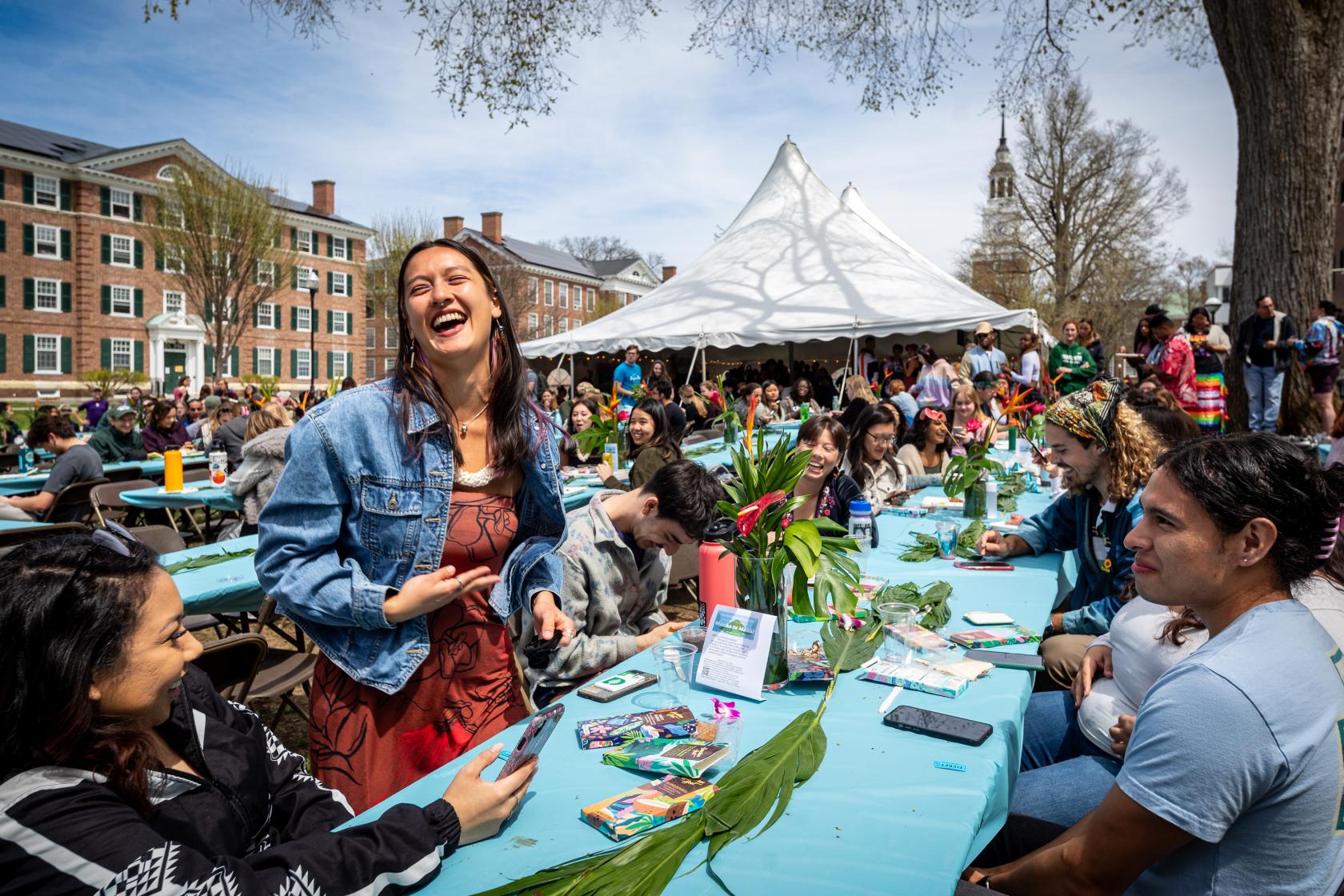 For the rest of the day, the ceremony took a more joyous turn. One of the most comical competitions required pairs of dancers to hold a potato between their foreheads as they leapt into the air or touched the ground. Powwow committee co-chair Ahnili Johnson-Jennings ’23 and her sister, Alayah Johnson-Jennings ’21, came in second. The Dartmouth junior said she was thrilled that her sister, two brothers, mother, and father, Derek Jennings ’93, made the trip from Seattle.
For the rest of the day, the ceremony took a more joyous turn. One of the most comical competitions required pairs of dancers to hold a potato between their foreheads as they leapt into the air or touched the ground. Powwow committee co-chair Ahnili Johnson-Jennings ’23 and her sister, Alayah Johnson-Jennings ’21, came in second. The Dartmouth junior said she was thrilled that her sister, two brothers, mother, and father, Derek Jennings ’93, made the trip from Seattle.
“So many people showed up,” said Ahnili Johnson-Jennings. “I’m really proud of all the students and our co-chair, Jess Meikkle ’23. We’re connecting with alumni here on campus, and that’s really cool. The whole day has been amazing.”
DeLaney Thornton ’22, a member of the Coharie Nation, also served on the Powwow committee, and, as a vendor, sold her handmade beaded jewelry.
“Coming here from North Carolina, where a lot of folks I know just find work wherever they can, my first thought was, ‘People like me don’t go to places like this.’ But when I got here, it was open arms, especially within the Native community,” Thornton said.
At the end of the Powwow, students graduating this year formed a circle, and were given braids of sweetgrass, which, Master of Ceremonies Newell told them, has healing properties. “When you leave this place, it will be better because of your presence,” he said.
The day was capped off with an evening Powwow Honoring Dinner attended by the Dartmouth Native community and friends, which featured an announcement of the new Tribal Services and Solutions Project, made possible by $1 million in funding from donors.
From Mauka to Makai
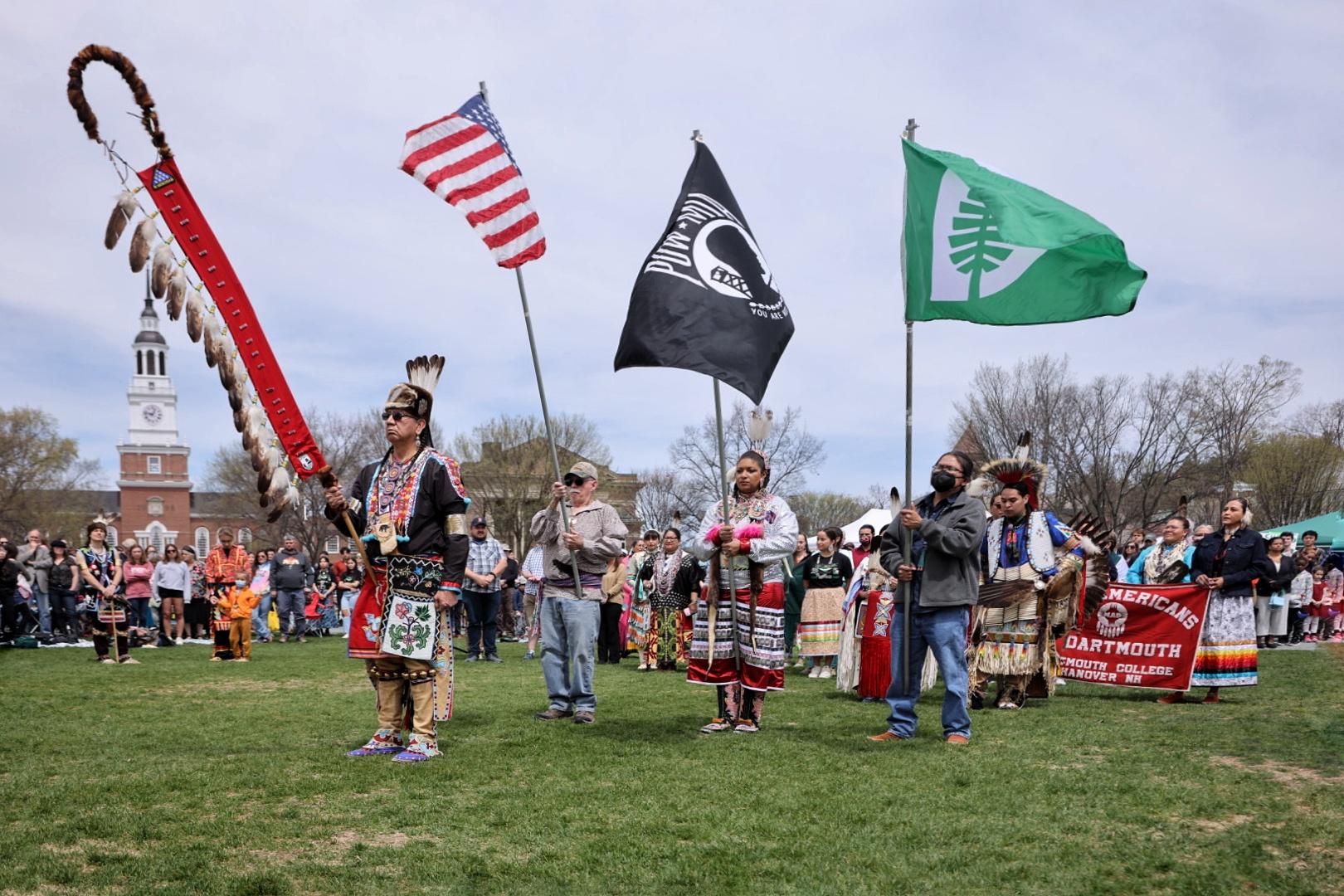 For the first time in its 50-year history, Powwow weekend included a celebration organized by the growing number of Pacific Islanders who have joined the Dartmouth community in recent years. This year’s Lu`au theme, “Mauka to Makai,” means “uplands to ocean,” alluding to resources that are shared by upland and seaside dwellers.
For the first time in its 50-year history, Powwow weekend included a celebration organized by the growing number of Pacific Islanders who have joined the Dartmouth community in recent years. This year’s Lu`au theme, “Mauka to Makai,” means “uplands to ocean,” alluding to resources that are shared by upland and seaside dwellers.
The islanders, in turn, shared freely with Upper Valley dwellers sitting at tropical flower-laden tables on Tuck Mall. As colorfully clad male and female members of Hokupa`a danced to traditional ukulele music, students, parents, and alumni heaped 350 plates with fresh fruit, roast pork, sweet potato, poi, and tuna poke. The fish was caught off the coast of Hawaii and prepared on campus by the father of Azariah Javillonar ’23. Javillonar’s parents, two grandmothers, an aunt, and an uncle made the long cross-country trip to help with the Lu`au.
“This weekend is so special,” said Javillonar. “Food reminds us all of home, and it’s so warm and comforting.”
Hokupa`a president Kalå Harman, who co-chaired the Lu`au with Naia Morse ’22, said that the Class of 2023 has not been able to hold a Lu`au until now because of COVID-19 restrictions. “Being part of Powwow weekend is a great way for us as Native Hawaiians and Pacific Islanders to make our presence known on campus,” Harman said.
“Built to Last”
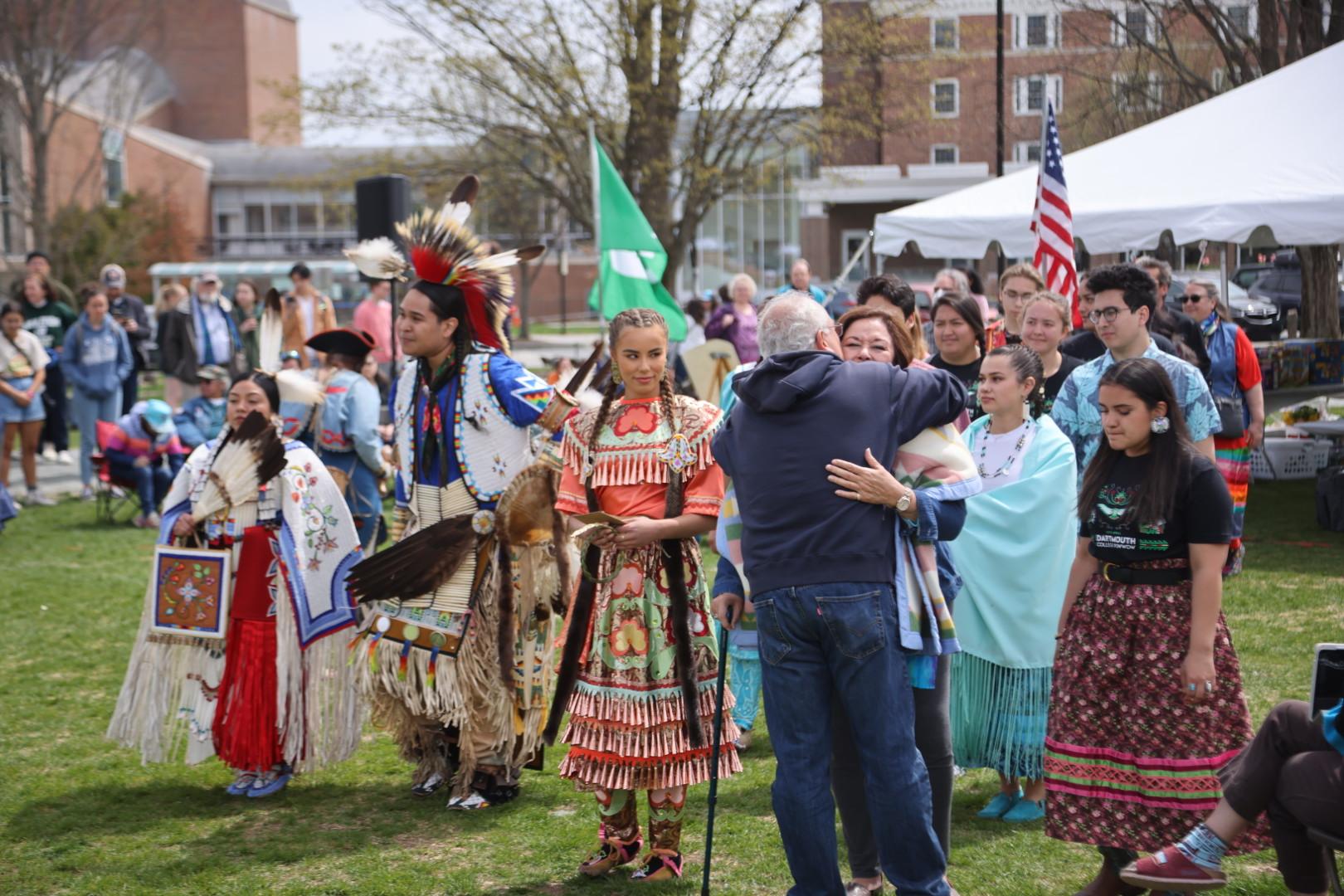 N. Bruce Duthu ’80, the Samson Occom Professor of Native American Studies and a member of the United Houma Nation of Louisiana, attended both Lu`au and Powwow. Duthu said his tribe does not hold Powwows, so he had a lot to learn when he first encountered the event as a student in 1977.
N. Bruce Duthu ’80, the Samson Occom Professor of Native American Studies and a member of the United Houma Nation of Louisiana, attended both Lu`au and Powwow. Duthu said his tribe does not hold Powwows, so he had a lot to learn when he first encountered the event as a student in 1977.
“My classmates explained the significance of the outfits, the color schemes, the dance moves, the rhythms—all that was brand new expression for me,” said Duthu.
He said he is proud of Dartmouth, not only for a half century of Powwows, but for a long-lasting, inclusive commitment to Native American and Indigenous studies.
“It takes a lot of work to sustain something like this. We’ve seen a number of other universities start initiatives on Native studies, recruit Native students, and then lose support at higher levels of administration. Our alumni and the Powwow itself show staying power. We’ve built something that was made to last.”


